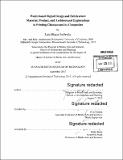Water-based digital design and fabrication : material, product, and architectural explorations in printing chitosan and its composites
Author(s)
Mogas-Soldevila, Laia
DownloadFull printable version (13.17Mb)
Other Contributors
Massachusetts Institute of Technology. Department of Architecture. Program in Media Arts and Sciences.
Advisor
Neri Oxman.
Terms of use
Metadata
Show full item recordAbstract
Conventional digital design tools display little integration between shape formation and materialization resulting in disassociation between shape and matter. Contrarily, in the natural world shape and matter are structured through growth and adaptation, resulting in highly tunable and hierarchically structured constructs, which exhibit excellent mechanical properties. Working towards integration, rigorous bottom-up natural material studies have resulted in a novel multi-scale digital design and fabrication platform that is precisely tailored, viable, and a rich companion to develop sustainable explorations across application scales integrating shape and matter control. Specifically, the research introduces design and environmental motivations driving novel sustainable digital manufacturing of water-based biomaterial structures at the architectural, and product-scale. Water is harnessed to tune biomaterial properties, to guide shape formation by natural evaporation, and to fully recycle and reuse material structures. Initial outcomes demonstrate self-supporting structural constructs displaying multi-functionality informed by graded material properties and hierarchical distribution depositions. I discuss contemporary literature in water-based manufacturing, and detail methods of the novel additive fabrication platform that combines a robotic positioning system and customized multi-barrel deposition system. Important contributions of the platform development as a design companion serve to advance sustainable digital manufacturing and propel it towards biologically inspired and material-informed techniques. Integrated material-based design studies, novel technology development, and sustainable motivation, produce an invention that outputs functional biodegradable products, reduces the need for external energy sources for fabrication, operates at room temperature, uses mild chemicals, and could embed productive microorganism cultures due to the biocompatibility of the materials used, pointing towards new possibilities for digital fabrication of living materials. Finally, the work advocates for the designer to play the role of a cohesive thinker, as well as a rigorous science and aesthetics explorer, able to seed novel processes that emerge from material studies towards digital design and advanced fabrication. Keywords: new design companions; material-driven design; additive manufacturing; water-based digital fabrication; bio-materials catalogue; environmental engineering; architectural design; product design; biological design.
Description
Thesis: S.M., Massachusetts Institute of Technology, School of Architecture and Planning, Program in Media Arts and Sciences, 2015. Cataloged from PDF version of thesis. Includes bibliographical references (pages 63-66).
Date issued
2015Department
Program in Media Arts and Sciences (Massachusetts Institute of Technology)Publisher
Massachusetts Institute of Technology
Keywords
Architecture. Program in Media Arts and Sciences.